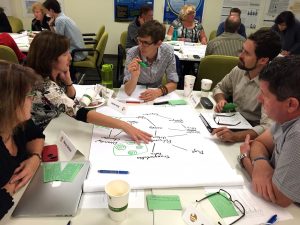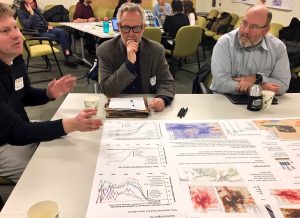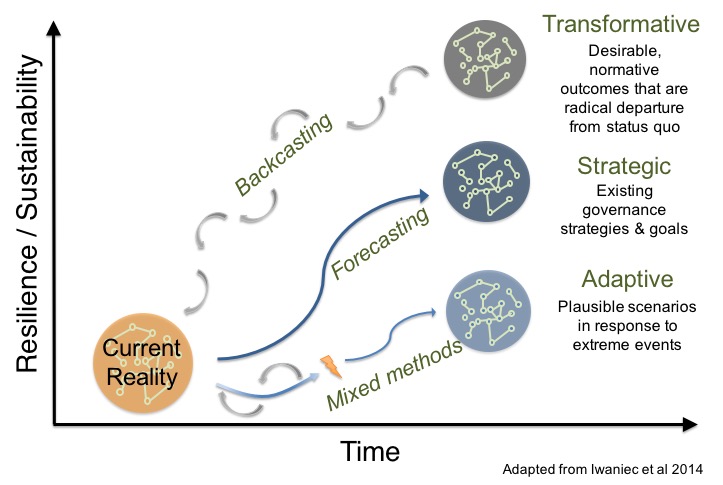Project Summary
 Urban sustainability and resilience are important guiding visions for cities. Urban ecology can bring useful perspectives on the future development of cities, but requires collaborative approaches to address city planning and management needs. We co-develop scenarios to explore alternative social-ecological-technological futures using three distinct methodological approaches. We explored adaptive, strategic, and transformative futures. Adaptive futures are developed in response to extreme events. Strategic futures are projected forward using existing municipal goals and targets. Transformative futures are back-casted from radically transformed visions of sustainability. This project integrates plausibility-based futures (what is most likely to happen) and desirability-based futures (what we would like to happen).
Urban sustainability and resilience are important guiding visions for cities. Urban ecology can bring useful perspectives on the future development of cities, but requires collaborative approaches to address city planning and management needs. We co-develop scenarios to explore alternative social-ecological-technological futures using three distinct methodological approaches. We explored adaptive, strategic, and transformative futures. Adaptive futures are developed in response to extreme events. Strategic futures are projected forward using existing municipal goals and targets. Transformative futures are back-casted from radically transformed visions of sustainability. This project integrates plausibility-based futures (what is most likely to happen) and desirability-based futures (what we would like to happen).
Through collaborative workshops with community, municipal, and academic stakeholders, we identified key priorities and strategies that decision makers are using to frame urban development and address climatic extreme events (i.e., flood, drought, and heat). We also identified systems and normative conflicts and trade-offs within the distinct future pathways. Development of these scenarios allows us to contrast diverse alternative future pathways and explore interacting strategies for urban sustainability and resilience. This project demonstrates how scenario construction can enhance research and decision-making capacity for long-range sustainability planning.
Participating Institutions
- Arizona Forward
- Arizona Interfaith Power & Light
- Arizona State Climate Office
- ASU representatives (Central Arizona-Phoenix-Long-Term Ecological Research, Decision Center for Desert City, Global Institute of Sustainability and Innovation, Sustainability Cities Network, UREx Sustainability Research Network)
- Municipalities of Goodyear, Mesa, Phoenix, Scottsdale and Tempe
- Departments of Planning, Public Works, Environment and Sustainability, and Water Resources from the cities of Scottsdale, Phoenix, Mesa, Tempe, and Goodyear
- Environmental Protection Agency
- Inter Tribal Council of Arizona
- Keep Phoenix Beautiful
- Maricopa Association of Governments (Department of Public Health, Department of Transportation)
- Maricopa Flood Control District
- Sonoran Institute
- St. Luke’s Health Initiative
- United States Department of Housing and Urban Development
- University of Arizona Cooperative Extension
- Valley Permaculture Alliance
- Watershed Management Group
What is a scenario?
A scenario is a plausible and coherent narrative about the future of a place or a situation. Scenarios are plausible in the sense that a future scenario emerges from historic and present-day conditions. Scenarios are coherent in the sense that they re ect causal relationships between system variables that can be tested and that are internally consistent. However, within these constraints, there is an invitation to think creatively and to push the limits of what we often think is possible, desirable, or inevitable.
Why scenario planning?
 Scenarios make explicit the assumptions that different actors around the table may carry implicitly about the way that things work. Scenarios are particularly good at helping participants articulate their values, visions and ideas about change
Scenarios make explicit the assumptions that different actors around the table may carry implicitly about the way that things work. Scenarios are particularly good at helping participants articulate their values, visions and ideas about change- Scenarios point to gaps in understanding, data needs, and they can integrate diverse forms of knowledge
- Scenarios can be used to explore the impact of alternative policies choices into the future in such a way that practitioners can assess, evaluate, and contrast the relative bene ts and impacts of different policies
- Scenarios help to anticipate and deal with uncertainty and shocks
- Scenarios bring people together around a cohesive vision of the future
Why co-produce future scenarios?
In participatory scenario development, researchers and city practitioners co-produce coherent future visions that:
- Assess the desirability of alternative futures
- Explore interactions, conflicts, and tradeoffs in social-ecological-technical systems (SETS)
- Inspire and promote innovative urban ecological infrastructure solutions
- Assess and evaluate a range of different outcomes and possibilities
- Enhance decision-making capacity and guide long-term planning
- Link anticipatory knowledge and visions to action!
Types of Scenarios
 Adaptive Scenarios: explore strategies in response to extreme events using mixed forecasting and backcasting approaches. In this project, adaptive scenarios deal with drought, heat and urban flooding.
Adaptive Scenarios: explore strategies in response to extreme events using mixed forecasting and backcasting approaches. In this project, adaptive scenarios deal with drought, heat and urban flooding.- Transformative Scenarios: scenarios that explore normative futures based on sustainability / resilience goals of radically transformed futures developed using a backcasting approach.
- Strategic Scenarios: are built based on the goals and strategies outlined in municipal-level planning documents for each city. The strategic scenario can be considered a baseline against which to compare the co-produced adaptive and transformative scenarios.



 Scenarios make explicit the assumptions that different actors around the table may carry implicitly about the way that things work. Scenarios are particularly good at helping participants articulate their values, visions and ideas about change
Scenarios make explicit the assumptions that different actors around the table may carry implicitly about the way that things work. Scenarios are particularly good at helping participants articulate their values, visions and ideas about change